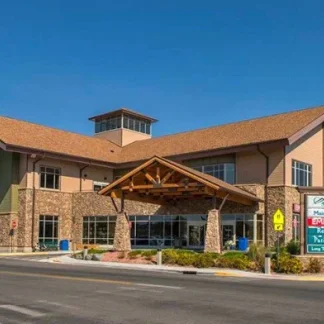AA - Alcoholics Anonymous
AA – Alcoholics Anonymous is a non-profit rehab located in Cody, Wyoming. AA – A...
Located in Cody, Wyoming, Cedar Mountain Center provides mental health and alcohol and drug rehab services to children, adolescents, and adults. Their services are provided through an intensive outpatient program.
Cedar Mountain Center offers comprehensive evaluations to determine the best treatment plan for each person. Services include:
Intensive Outpatient Individual therapy, group therapy, family therapy, medication management, and educational classes are provided. To begin the process, each person will participate in an evaluation to create an individualized treatment plan that supports mental health and addiction recovery. Age specific care is provided, separating children, teens, and adults so they can focus on the appropriate areas of life and the common triggers experienced during each stage. Psychiatric services are included in this treatment program to ensure proper care and interventions are administered. Clients may choose to step into A]aftercare programming upon graduation. This includes self-help groups and continued maintenance.
Contact us for more information: (307) 578-2531

Connect with Cedar Mountain Center by calling their admissions team directly.
(307) 578-2531 Website Get DirectionsThe Commission on Accreditation of Rehabilitation Facilities (CARF) is a non-profit organization that specifically accredits rehab organizations. Founded in 1966, CARF's, mission is to help service providers like rehab facilities maintain high standards of care.
CARF Accreditation: Yes
Experiential therapy is a form of therapy in which clients are encouraged to surface and work through subconscious issues by engaging in real-time experiences. Experiential therapy departs from traditional “talk therapy” by involving the body, and having clients engage in activities, movements, and physical and emotional expression. This can involve role-play or using props (which can include other people). Experiential therapy can help people process trauma, memories, and emotion quickly, deeply, and in a lasting fashion, leading to substantial and impactful healing. At least three times weekly their patients enjoy a fitness center where aerobic and strength training machines are available.
The family program is available to anyone impacted by a loved one's use of alcohol and/or drugs. The program is a three-day structured process directed at issues of illness and wellness in families affected by addiction. Sessions are attended by family members and the chemically dependent individual. Segments of the program are designed specifically for family members as they begin their healing process. Participants will have the opportunity to learn ways of working together to establish a new life of recovery.
Group therapy is any therapeutic work that happens in a group (not one-on-one). There are a number of different group therapy modalities, including support groups, experiential therapy, psycho-education, and more. Group therapy involves treatment as well as processing interaction between group members.
In individual therapy, a patient meets one-on-one with a trained psychologist or counselor. Therapy is a pivotal part of effective substance abuse treatment, as it often covers root causes of addiction, including challenges faced by the patient in their social, family, and work/school life.
The family program is available to anyone impacted by a loved one's use of alcohol and/or drugs. The program is a three-day structured process directed at issues of illness and wellness in families affected by addiction. Sessions are attended by family members and the chemically dependent individual. Segments of the program are designed specifically for family members as they begin their healing process. Participants will have the opportunity to learn ways of working together to establish a new life of recovery.
Group therapy is any therapeutic work that happens in a group (not one-on-one). There are a number of different group therapy modalities, including support groups, experiential therapy, psycho-education, and more. Group therapy involves treatment as well as processing interaction between group members.
In individual therapy, a patient meets one-on-one with a trained psychologist or counselor. Therapy is a pivotal part of effective substance abuse treatment, as it often covers root causes of addiction, including challenges faced by the patient in their social, family, and work/school life.
Group therapy is any therapeutic work that happens in a group (not one-on-one). There are a number of different group therapy modalities, including support groups, experiential therapy, psycho-education, and more. Group therapy involves treatment as well as processing interaction between group members.
In individual therapy, a patient meets one-on-one with a trained psychologist or counselor. Therapy is a pivotal part of effective substance abuse treatment, as it often covers root causes of addiction, including challenges faced by the patient in their social, family, and work/school life.
In individual therapy, a patient meets one-on-one with a trained psychologist or counselor. Therapy is a pivotal part of effective substance abuse treatment, as it often covers root causes of addiction, including challenges faced by the patient in their social, family, and work/school life.
AA – Alcoholics Anonymous is a non-profit rehab located in Cody, Wyoming. AA – A...
The Park County Drug Court offers intensive outpatient treatment to the high ris...
Yellowstone Behavioral Health Center - HOPE House provides outpatient mental hea...
The Yellowstone Behavioral Health Center (YBHC) is a CARF-accredited behavioral ...